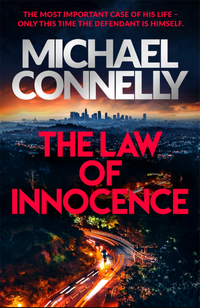 |
The Law of Innocenceby Michael Connelly eARC, 416 pg. Read: September 26-27, 2020 |

What’s The Law of Innocence About?
On his way home from celebrating a win in court—a precious finding of “NG” (Not Guilty), Mickey Haller is pulled over in a traffic stop that quickly goes south and Haller finds himself in the back of the patrol car while the officer opens his trunk to discover a dead body—it turns out to be a former client of Haller’s who happens to owe his former defense lawyer a hefty amount of money.
It’s clearly a frame-up. There’s no reader who will buy Haller committing the crime in this way—sure, it’s possible that Haller would be driven to murder by something (for the sake of argument), but he wouldn’t do it this way. He’s too slick, too clever for that. Thinking like that is well and good for readers of Crime Fiction, it’s not how the police think. If you get all the evidence pointing at someone, they’re likely to be guilty, especially if there’s no evidence pointing in another direction.
Which is what happens here. So from his cell in the Twin Towers Correctional Facility, Haller has to plan his own defense. Sure, he knows all the conventional wisdom and jokes about defending yourself, but defending people in court is what has defined Mickey Haller for his adult life and there’s no way he can let someone else take the lead on this. It’s the fight of his life—literally a fight for his life—and Haller has to be the one doing the fighting.
Haller can’t count on a “reasonable doubt” defense. It won’t be enough to get a “Not Guilty” verdict, not if he wants to be a defense lawyer ever again, he can’t go into court with the world thinking he got off on a technicality. Haller has to prove he’s innocent, and the only way he can do that is by finding out who’s guilty, and proving that in court.
The prosecuting attorney is no slouch—frequently in legal fiction, you get someone who’s clearly there to play Washington Generals to the series protagonist’s Harlem Globetrotters, putting up a token case for the defense attorney to use as a way to show off all his tricks. But Dana Berg, star prosecutor for the Major Crimes Unit is hard, smart, and utterly convinced that Haller is guilty. So convinced that she’s not above using as many tricks and sneaky moves as Haller. She’s a worthy opponent which makes it all the better.
Hail, Hail, the Gang’s All Here
Mickey’s friends and family won’t believe this accusation—he’s not a killer. They know this and show up to help—many of them probably would if they had some doubt about his guilt, but we all know that Haller’s half-brother. Harry Bosch, wouldn’t have anything to do with him if Bosch thought there was a chance he was a killer. But Bosch is as involved as Cisco, Haller’s own investigator is. Lorna’s there, as well as Jennifer Aronson. I wasn’t terribly impressed with Aronson the last time we saw her in The Gods of Guilt, but she’s come a long way since then and is key to Haller’s defense.
It keeps going, Maggie “McFirece” McPherson, his ex-wife, and his daughter, Haley, are stalwart supporters, too—and Maddie Bosch even pops in. I’ve always liked Haley and enjoyed her a lot here. You’ll never see me say anything against Maggie’s character, either. Connelly created a great family for Haller back in The Lincoln Lawyer and they continue to pay off here.
While it’s great to see everyone show up to support and help—and Haller needs all that he can get—it’s his novel, it’s his fight, it’s his life in the balance and the novel’s focus is solely on him. With a character like Bosch, he’s a constant threat to steal the reader’s (and likely the writer’s) attention—but he doesn’t even come close. It’s all about Mickey Haller.
Isn’t this just like Fair Warning?
I was slightly afraid of that when I read the blurb for this—do we really need two books from Connelly in 2020 where the protagonist is suspected of a murder that there’s no chance at all that he committed? I figured Connelly would pull it off, but, yeah, there was a degree of trepidation on my part going into it.
Here’s where they were different—in Fair Warning, McEvoy being suspected is just his way into the mystery, and the shadow of suspicion may linger over him, but it’s never really much more than that. But here, Haller being the suspect is the whole novel—he’s only the suspect for a couple of days (which we don’t even see), he’s the accused for all but the first chapter. That makes all the difference, there’s no way to compare the experiences of McEvoy and Haller.
Current Events
This book takes place at the close of 2019 and over the first few months of 2020, and through news reports in the background and some conversations between characters we get glimpses of what’s going on in American culture at the time—specifically, the impeachment and reelection bid of Donald Trump and the early days of the spread of COVID-19. Neither makes a significant impact on the plot, but they act as part of the background, nailing the events of the novel to a specific moment.
I wondered for a while if this would make the novel dated in years to come, making it too “of the moment” to last. But the more I think about it, the more I think adds some flavor, some perspective to the novel, and the way that Connelly uses the current events to ground the novel. I ended up really liking the way he did it. Sure, Haller’s very few and quick comments about the President may put off some readers, if they couldn’t have guessed Haller’s political leanings, they haven’t been paying attention.
So, what did I think about The Law of Innocence?
If I hadn’t been approached to be on this tour, what would’ve likely happened is this: I’d buy The Law of Innocence on release day and had been really excited about it, but would’ve set it aside so I could catch up on some backlog—and it would’ve ended up languishing away on my shelf unnoticed. I’d have probably have made it my last book of 2020 or first of 2021 as a little treat to myself. And I would’ve been mad at myself for that once I got to about the 20% mark (if not earlier). For this to be available and unread would be just wrong.
There’s a one page (or so) introduction/foreward that’s just dynamite, followed by a really strong first chapter, and then starting in chapter 2, we’re off to the races. It’s just unrelentingly good, gripping, fast-paced, smart, and tension-filled from that point through to the jaw-dropping end. Sure, you may be confident that Haller would prevail, but you can never be sure for a moment how that might come to pass—and any time you start to think you know? You quickly discover that was hubris.
Connelly is one of the best in the business, but he’s not satisfied with coasting on his reputation or his laurels, he’s constantly striving to prove that he’s one of the best around—and usually succeeds at it. The Law of Innocence has him doing just that. The prose is lean and tight, the characterizations are spot on, the pacing is perfect and you just can’t put this down. I had a lot going on last week when I read this and several things I needed to accomplish—and I ignored almost every single one of them just so I could finish this. I gave myself five days to read this and finished it in two. Between the story, the characters, and the way Connelly put this together, I had no choice.
A lot of the legal thrillers I’ve read over the last couple of years save some of their best moments for things the lawyers get into outside of the courtroom, The Law of Innocence doesn’t do that. Yes, there are some good moments with Haller and the team investigating things, or while Haller is incarcerated. But the best moments of the novel take place in the arena that Haller comes most to life—in the courtroom, facing off against a good prosecutor, in front of a smart judge and a jury that he can only hope to persuade. Haller’s good at putting the pieces of a puzzle together (especially when Bosch and Cisco give him the right pieces), he can get a witness to give up just the right information, but he shines when he’s using the rules of the court, rules of evidence and the laws of California to further his own ends.
If you’ve been through the wringer with Haller before, you have an idea of what to expect—and you won’t be disappointed. If you’ve never spent time with the Lincoln Lawyer before this, you’re in for a treat. Either way—The Law of Innocence is one of the best thrillers of 2020 and you need to get your hands on it.

Disclaimer: I received this eARC from Orion via NetGalley and Compulsive Readers in exchange for this post—thanks to all for this, but the opinions offered above are solely mine.
This post contains an affiliate link. If you purchase from it, I will get a small commission at no additional cost to you.

My thanks to Tracy Fenton and Compulsive Readers for the invitation to participate in this tour and the materials (including a copy of the novel) provided.


Read Irresponsibly, but please Comment Responsibly